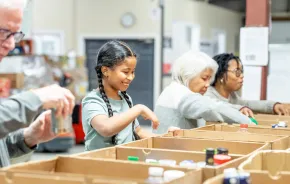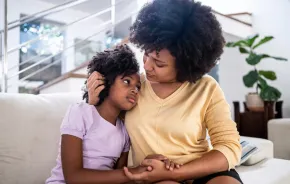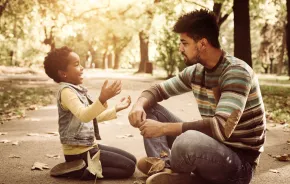
After years spent working in the adult mental health field, Jen McCormick found a new calling at summer camp. It was 2006 and she was volunteering at The Moyer Foundation's Camp Erin, an overnight weekend camp held in Carnation, Washington, for kids and teens grieving the death of a loved one.
“I knew I wanted to do something difficult and meaningful,” McCormick recalls of the time. At Camp Erin, she discovered a desire to work with those grappling with one of life’s greatest challenges. “You see a change over time with grieving kids and adults,” she says. “There’s always transformation.”
Seven years after her trip to Camp Erin, McCormick became the clinical director of The Healing Center, a Seattle-based grief support community. While her experience — McCormick has a master’s in social work from the University of Washington as well as a background in psychological trauma — made her a natural fit, Cindy Burdell, The Healing Center’s executive director, says it’s McCormick’s deep interest in the welfare of clients that makes her an effective leader.
Those who work alongside her also treasure McCormick’s sense of humor and focus on inclusion. “She brings her full self to meet everyone, no matter who you are,” says Emily Rock, a volunteer at The Healing Center. “Whether you’re a member of the board or a 6-year- old, she gives you her full presence, skill set and kindness.”
The Healing Center works with more than 400 people of all ages who’ve experienced the death of a loved one, and offers support groups including for children and for people who’ve lost someone to suicide. McCormick says she strives to make The Healing Center feel like a safe, comfortable environment. Tucked into the Ravenna neighborhood, the center is in a former private home, with the attic converted into a kids’ space, complete with a foosball table, stuffed animals and an art room.
“The main philosophy of the center idea is to get people in a room together that understand what they are all going through,” McCormick says. “Outside of here, they may not be able to talk about it.”
When people go through great losses, how can those around them help?
The answer to that is nobody knows what to do and that’s OK. Be honest and say, ‘I don’t know what to do, but I want to support you.’ Offer concrete things you can do for the person: ‘I will take your kids to school, help with paperwork and legal stuff or I can be on your 3 a.m. call list.’ Keep showing up over time, especially on birthdays and anniversaries.
What’s the most misunderstood part of your job?
That it’s super depressing, which it’s not. I get paid to hang out and do crafts with kids and talk about meaningful things. Yes, it can be difficult and there are tons of sad stories, but it’s not a depressing job, because you see people come through it.
What book saved you or changed your life?
I Know This Much Is True by Wally Lamb. The book includes schizophrenia and PTSD, and I read it before I applied to grad school. Also, Out of the Shadows by E. Fuller Torrey, which is about mental illness in America. My other passion is writing, and Raymond Carver is my favorite author. My favorite short story of his is “What We Talk About When We Talk About Love,” and I love his poem “Late Fragment.”
On a rainy Pacific Northwest morning, what gets you motivated and out of bed?
My kids and coffee. Charlie is 7, and Clara is 4. I prefer a vanilla latte made with 2 percent milk.
If you could have one superpower, what would it be and why?
I’d want arms that stretch like Stretch Armstrong so I can grab things without getting up. I could sit on the couch and read to my children while my arms are making them dinner.
If you could dine with anyone, living or dead, who would that be and why?
Jane Addams, the mother of social work who started the profession and founded the Hull House in Chicago. She was a feminist in a time when it was probably really difficult to be a feminist. I want to ask her what motivated her and how she kept fighting.











